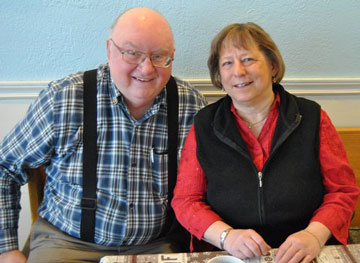 Photo: © iStockphoto.com/101cats
Photo: © iStockphoto.com/101cats
Ross Carne remembers looking out of his kitchen window in Collingwood, Ont., and watching the shipyard and factory workers as they rode or walked to work. He deeply wished he could join them.
Ross' leg had been amputated below the knee due to a transport-truck accident and he suffered from bipolar disorder. Nevertheless, the 30-year-old felt a deep shame that he could not work. That his wife, a mortgage officer at a local bank, loved and supported Ross, didn't lessen his anguish.
“I considered myself unemployable, merely a stay-at-home dad to my 18-month-old son, Dave,” he says. “But the handicap was all in my mind.”
Roadmap Wanted
Being raised by a father who had succeeded despite his own handicaps and by a mother who was a multi-talented housewife and helped run her family's egg farm business had taught Ross the value of hard work. The fact that he wasn't working—at least, by his definition of work—mortified him.
“I tried my hand at many occupations but I would end up quitting after a few weeks,” Ross says. “I couldn't stand on my prosthesis for long and I was often ill because of my bipolar disorder.”
Personal shame was a greater handicap, however.
“Disability and illness aside, the plain fact was that, with bachelor's and master's degrees to my credit, I was too proud to consider working most 'regular' jobs,” he admits now.
Ross prayed for some kind of roadmap to help him overcome his handicap and shame, but it was his way of thinking that needed to be overhauled. Ultimately, the “roadmap” Ross sought would be found on the front seat of a taxi.
Making a Go of It
“I used to look down my nose at taxi drivers once upon a time,” Ross smiles, “but I wasn't in a position to be picky anymore.”
Reluctantly applying for a position as a taxi driver, Ross found to his surprise that he was good at the job.
“I worked hard at getting my customers to their destination quickly and safely,” he says. “I was prompt, courteous and diligent. And I kept my taxi neat, clean and in great running order.”
But Ross was more than just a taxi driver.
“People felt at ease sharing their stories with me and I often became a sounding board for some of my regular customers and their concerns,” Ross says. “In my experience, most fares already had the solutions to their predicament going in. All they needed was someone with a listening ear to talk it out.”
Driving a taxi also strengthened Ross' faith.
“During long fares, I spent a lot of time in prayer,” Ross states. “The 12 years I spent driving a taxi deepened my Christian faith. I realized that I could take my concerns to God. He understands who we are and is sympathetic to our needs.”
Ross had convinced himself that he was unemployable, but being a taxi driver gave him a new sense of purpose. It was not an overnight realization; rather, it unfolded one trip at a time, one fare at a time. Before he knew it, Ross had become one of the company's top cabbies.
“I only realized later how much my wife, son and friends had prayed I would make a go of it,” Ross says. “And I did!”
“No Longer Ashamed”
As Ross became proud of his job, the shame he had worn around him for so long fell off his shoulders like a gentle rain. And he realized that being employed or unemployed did not make him any less valued in God's eyes.
His new attitude also brought with it another revelation.
 Ross Carne and his wife, Jan
Ross Carne and his wife, Jan
“I had been so wrapped up in my own concerns, I'd ignored and downplayed everything I'd been doing all those years with and for my son,” Ross admits. “But because of my flexible schedule as a cabbie, I was there for all of Dave's events at school, and as he grew older and became proficient at sports, I drove him to every baseball and hockey practice and game.”
For too long, Ross considered what he did mundane and routine. But one
evening at a community volunteer event, it clicked.
“I was sitting at a table with eight other parents who were all bemoaning
the fact that, for one reason or another, they had missed their children's first steps, or their first words, baseball games and school plays,” Ross relates. “They were all influential movers and shakers in our community—and I was a cabbie.”
But with a fatherly pride he didn't know he had until then, Ross piped up and said, “I have seen my son's every 'first'—and I wouldn't trade one minute of it.”
“At that moment,” Ross smiles, “I realized I was proud of the gifts God had given me to earn a living and care for my son. I was no longer ashamed of who I was or what I did.”









Leave a Comment